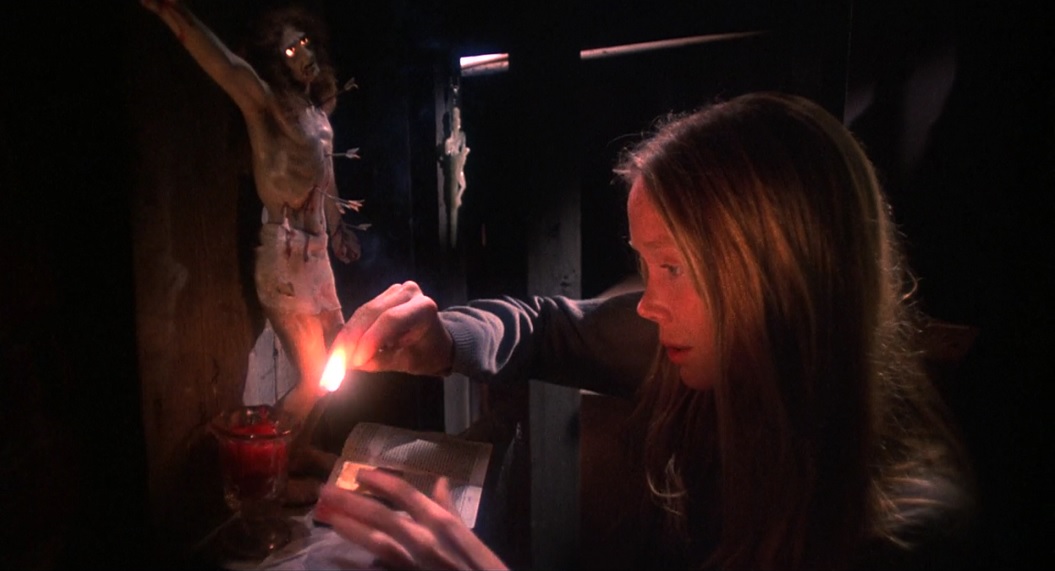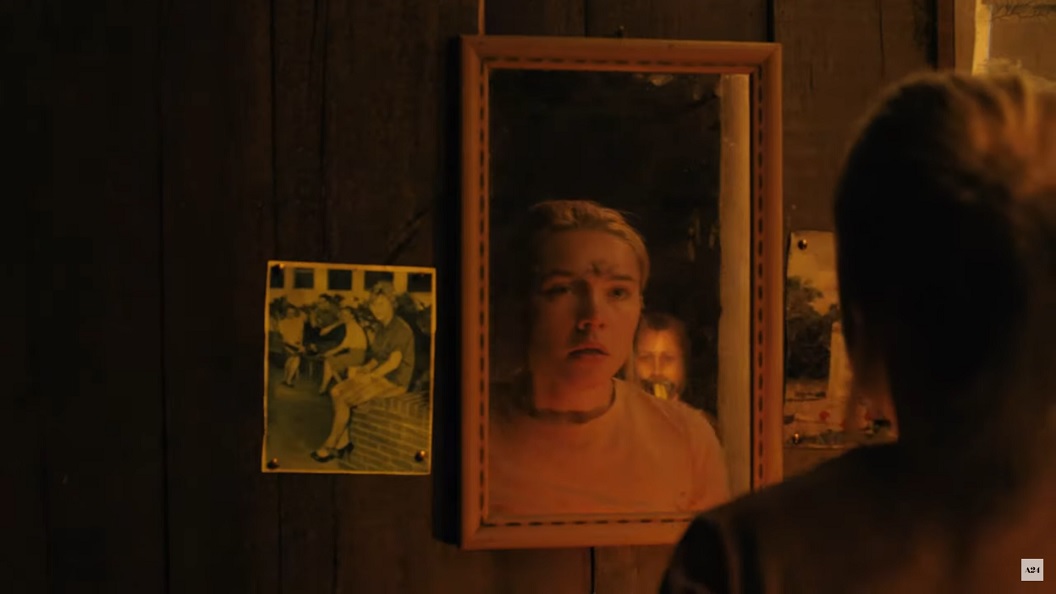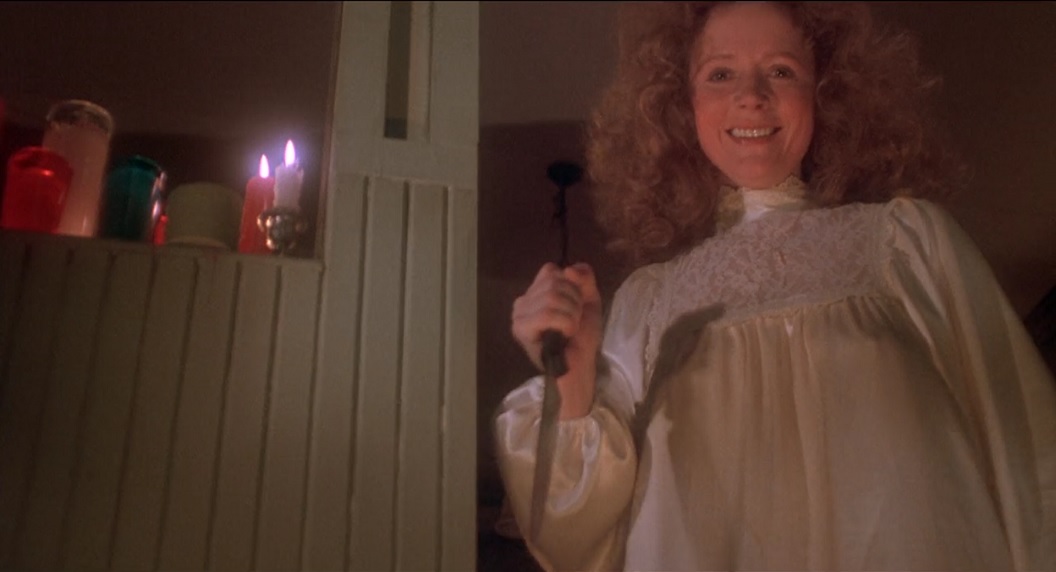AS CHAPTER TWO OF 'IT' HITS THEATERS, MUCH TALK OF STEPHEN KING AND BEST ADAPTATIONS


I've seen Ari Aster's Midsommar several times now, and during that scene in the film where Dani is tripping and freaking out, trying to run away, she runs into this very small cabin and closes the door. We see a brief black screen before she lights a match and candle, and finds herself in front of a mirror (as above). This quick moment and the sort of subtle but deliberately punctuated impact it has on the viewer reminds me of Carrie (in Brian De Palma's Carrie) screaming in the closet she's just been locked in, but then calming down enough to light a match and begin saying her prayers. A bit later she goes up to her room and looks into a mirror that is about the same size as the one Dani is looking into in the cabin. The scene in Midsommar is very rapid and brief, yet seems at its essence to be informed by the way these actions are presented in De Palma's film, both visually and sonically-- kinetically.
And of course, we have read Aster talk about De Palma's Carrie on several occasions. Most recently, according to Esquire's Tom Nicholson, Aster talked about De Palma's film on an A24 podcast with fellow director Robert Eggers, saying he was "destroyed" by Carrie at a young age. "I wasn't able to watch it again until my 20s, and then I realized it's a really sad comedy. I could not get the image of Piper Laurie chasing Sissy Spacek around this candlelit house out of my head. She's got this horrible smile, holding a knife. That has come back to me in so many ways. Still, I'll have a nightmare about that."

NICOLAS CAGE: ASTER "HAS THAT AUTEUR PANACHE, LIKE DE PALMA DID BACK WHEN HE WAS DOING FILMS LIKE 'SISTERS' & 'PHANTOM'"
IndieWire's Eric Kohn posted today about a chat he had with Nicolas Cage at the Toronto International Film Festival, where Cage's new film Color Out of Space, directed by Richard Stanley, is having its world premiere during tonight's Midnight Madness:
“Ari Aster, to me, is an event,” Cage said. “If you look at ‘Hereditary’ and ‘Midsommar,’ so much thought goes into them. They’re uniquely different, but you can tell that they come from the same mind. He’s a real student of film.” The actor recalled watching “Midsommar” in a theater following its release this summer, and recognized the influence of Ingmar Bergman’s eerie character studies on Aster’s sprawling tale of a Swedish cult and the young Americans drawn into its web.“It was exciting,” Cage said. “I saw those Bergmanesque shots. I remember thinking, ‘This is like Bergman. Then I heard a podcast where he was talking about the closeups in ‘Persona,’ and I’d just gone through my Bergman kick, so I was like, well, this is really someone willing to explore and try new things in cinema.” Cage described Aster as “someone who has that auteur panache, like De Palma did back when he was doing films like ‘Sisters’ and ‘Phantom of the Paradise.’”
Aster’s first two features take an artful approach to horror movie traditions, but Cage said there was one variation on that genre he had no interest in. “Horror is fine, you can be very creative with that. The thing I really don’t like is what they call ‘torture porn,’” he said. “If you’re just watching some woman get cut up, that’s really not for me. It needs to have a reason there, a story, that propels the characters, an emotion connected to it. I would probably have to pass on just gratuitous violence.”
Cage has been a movie buff his whole life. As a child growing up in the ’70s, his father often took him to repertory screenings at the New Beverly Cinema, where he still has fond memories of watching James Dean in “East of Eden,” Marlon Brando in “On the Waterfront,” James Cagney in “White Heat,” and Todd Browning’s “Freaks.” He continues to consume new releases and classics as part of his regular viewing habits. “I am a film enthusiast and genuinely transport myself with watching films,” he said. “In a way, it makes me feel like I’m still with my father.”
"NEW GOLDEN AGE" OF STEPHEN KING ADAPTATIONS HAS MANY LOOKING BACK AT 'CARRIE', ETC.
With Andy Muschietti's highly anticipated It Chapter Two hitting theaters this weekend, The Ringer's Ben Lindbergh posted an article Thursday with the headline, "Welcome to the New Golden Age of the Stephen King Adaptation" (the headline has since been changed to "Why Hollywood Keeps Coming at the King").
Lindbergh's article includes interview quotes from Ian Nathan, who has a book coming out this week called Stephen King at the Movies, with a subtitle that promises "a complete history of the film and television adaptations from the master of horror." Nathan tells Lindbergh, "King arrived in the mid-70s with Carrie, just as a host of hot young, revolutionary horror directors, and I include De Palma in their number, were ready to transform the horror genre. The likes of Cronenberg, Carpenter, Romero, and Tobe Hooper … made their name with King and equally helped send him to the top of the bestseller lists. It was an era of excellent adaptations, mixing the freshness of King’s approach to horror archetypes with a modern, highly stylized approach to scares."
Meanwhile, several sites have been posting new rankings of Stephane King adaptations. Parade's Samuel R. Murrian ranks Kimberly Pierce's 2013 version of Carrie as the tenth worst ("Because Brian De Palma‘s version holds up so sturdily, the big question when this remake was announced was, of course: why?"), and De Palma's version at number 2, right behind Frank Darabont's The Shawshank Redemption. Regarding De Palma's Carrie, Murrian writes:
The one that started it all remains a landmark of American horror, a simple story with a heartbeat that’s impossible not to get invested in, even moved by. Brian De Palma‘s film is practically a 98-minute film school. Changes are made to the source material, bold stylistic choices are made right and left—and it all serves a purpose; everything works.For its first hour, Carrie is a deliriously entertaining, rising-star-studded tragicomedy. Then the prom scene hits—it will still make your blood run cold. Star Sissy Spacek and Piper Laurie, who plays Carrie’s violently fanatical mother, were both nominated for Oscars, an unprecedented feat for a horror movie.
Over at Thrillist, where several staff writers chose "The Scariest Stephen King Movie Moments of All Time," Esther Zuckerman writes about an unexpected choice from De Palma's Carrie:
The moment: Carrie takes a shower in the locker room
There are plenty of supernatural horrors to come in Brian De Palma's adaptation of Carrie, but there's something uniquely terrifying about the opening. After all, nothing is scarier than a bunch of teenage girls being genuine assholes. The porny gaze (let's just say it) that first permeates the girls' locker room where Carrie White showers after being humiliated in gym class shatters when Carrie finds blood between her legs. It's her period, but given her upbringing, she doesn't know that. Frantic, she runs to her classmates who immediately turn on her, their smirks morphing to jeers as they lob tampons and maxi pads her way. We're embedding the safe-for-TV cut, which frankly doesn't have the same power. It's not just the luridness that makes the moment so striking, it's the vulnerability of Carrie's nudity that's exploited when the other women start their taunts.
Back over at The Ringer, Adam Nayman ranks the ten best Stephen King movie adaptations, placing Stanley Kubrick's The Shining at the top spot, with De Palma's Carrie at number two:
It opens with an insidiously brilliant update of Psycho’s shower scene and ends with a jump scare that Hitchcock would have envied; in between, it’s merely the tenderest and most affecting movie ever made out of one of King’s novels. “Tender” is not a word usually associated with Brian De Palma, and there are aspects of Carrie more in line with (if not hugely formative of) the director’s sardonic sensibility: In between his virtuoso camera curlicues (spinning, tracking, soaring, plunging), he exploits the mean-girl high school milieu for bitchy humor and shameless T&A, and turns Carrie’s mom (Piper Laurie) into a ripe gothic-spinster caricature (“These are godless times,” she snarls at a classmate’s mother). He also goes a lot further than King in humanizing his heroine, aided immeasurably by the sublime work of Sissy Spacek—an impossibly brilliant actress who becomes translucent in front of the camera. We’re complicit in everything Carrie is thinking and feeling, and that includes her murderous rage in the home stretch, as baroque and deep red as any giallo while still rooted in a kind of bruised humanity. It’s that sense of betrayal, of somebody who hasn’t just broken bad but been broken, period, that conjures up such unholy fury, and which gives the last shot a power beyond its exacting Pavlovian reflexology (it may be the best-timed shock in movie history). Carrie is reaching out from beyond the grave, yes, but more importantly, she’s reaching out. In hell, as in life, she’s a lonely soul in need of a friend.
At Consequence of Sound, where every single Stephen King adaptation is ranked from worst to best, Leah Pickett writes of De Palma's Carrie, which comes in at number five:
De Palma’s Carrie, in the wake of William Friedkin’s landmark horror event The Exorcist three years prior, marked another watershed for the genre. Critics raved, careers rocketed (perhaps a young John Travolta’s most of all), and — in what is still a rarity for horror films — the Academy took notice. Sissy Spacek, in the gruesome title role that made her a star, and Piper Laurie, who hadn’t appeared onscreen since 1961’s The Hustler and shocked audiences as Carrie’s mentally unstable mother, received Academy Award nominations for their performances. Sure, Laurie may seem hammy by today’s standards, but she leaves her mark; after all, Moms from Hell don’t get much more terrifying than Margaret White.Although dated and, yes, more than a little bit campy, Carrie is a classic for a reason. For proof, re-watch the opening scene — how King and De Palma were able to capture the symbolic horror of “becoming a woman” with comments on the religious, social, and societal is beyond me, but they pull it off – and also, that prom scene, which is frenetic, lyrical, blood-soaked Sodom and Gomorrah theatre at its best.
And that 2014 remake? Eh, don’t bother.
Updated: Sunday, September 8, 2019 11:11 AM CDT
Post Comment | View Comments (5) | Permalink | Share This Post



